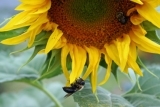
A common assumption has been that native plants and animals would “move,” or migrate, to higher elevations as temperatures rise, to maintain their “preferred” temperatures, but a new report by Jonathan Greenberg at UC Davis, shows that many California plant species moved downhill over the past 70 years.
According to Greenberg, “While the climate warmed significantly in this period, there was also more precipitation. These wetter conditions are allowing plants to exist in warmer locations than they were previously capable of.”
According to the news release summary:
“Many forecasts say climate change will cause a number of plants and animals to migrate to new ranges or become extinct. That research has largely been based on the assumption that temperature is the dominant driver of species distributions. However, Greenberg said the new study reveals that other factors, such as precipitation, may be more important than temperature in defining the habitable range of these species.
“The findings could have global relevance, because many locations . . . have had increased precipitation in the past century, and global climate models generally predict that trend will continue, the authors said.”
Many studies are showing that climate change is impacting plant and animal species, but because of the overlapping influence of so many factors, including temperature, precipitation, and elevation, and even factors such as increases in smog and carbon dioxide, it is too early to predict precisely how climate change will impact native species . . . and agricultural crop production.
Here are some UC Davis news summaries in just the last year on the impact of climate change on plant and animals species:
- Plants moved downhill, not up, in warming world – news summary
- Climate change impact on mountain plants at low elevations – news summary
- Warmer ocean waters favor aliens over natives – news summary
- Warming climate means harsher smog – news summary
- Rising CO2 levels threaten crops – news summary
- Changes in agriculture needed as world warms – news summary
- Climate tipping points may give no warning – news summary
- Butterflies reeling from impact of climate – news summary